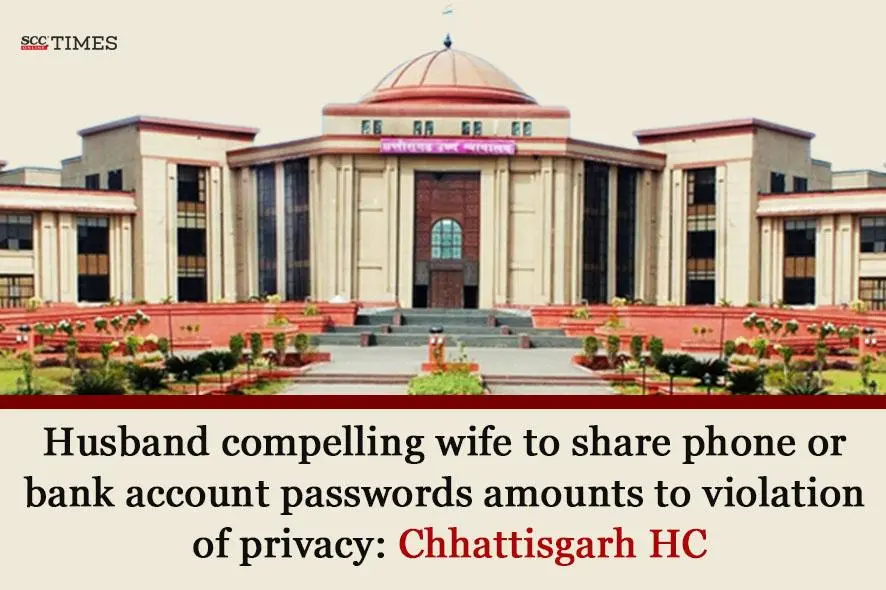Chhattisgarh High Court: In a writ petition filed by a husband challenging the order passed by the family Court wherein his application seeking a direction to produce call detail records (‘CDR’) of his wife’s phone number was rejected, the Single Judge Bench of Rakesh Mohan Pandey, J., rejected the petition, holding that allowing the husband’s application would lead to a violation of the wife’s right to privacy and the right to life and personal liberty guaranteed under Article 21 of the Constitution.
Background
In 2022, the parties got married according to the Hindu rites and rituals. Allegedly, the respondent-wife visited her parental house 15 days after the marriage, and soon thereafter, her behaviour changed drastically. The wife also misbehaved with the petitioner- husband’s mother and brother. When the wife refused to accompany the husband, he filed a petition under Section 9 of the Hindu Marriage Act, 1955(‘HMA’) for the restitution of conjugal rights.
Thereafter, the wife filed an application under Section 125 of the Criminal Procedure Code, 1973, before the Family Court and instituted proceedings under the Protection of Women from the Domestic Violence Act, 2005 (‘DV Act’) against her mother-in-law, father-in-law, and brother-in-law. She also lodged a complaint before the Mahila Thana against her in-laws. Subsequently, the husband filed a petition for dissolution of marriage under Section 13(1)(1a) of the HMA.
The husband applied (‘first application’) to the Senior Superintendent of Police (‘SSP’), requesting that the CDR of the wife’s mobile number be provided, on the grounds that he had doubts about her character. A similar application was moved twice in 2023 (‘second and third applications’). In the written arguments for the third application, the husband stated that his wife used to talk to her brother-in-law (jija) for long hours. He alleged that there might be an illicit relationship between his wife and her brother-in-law, and therefore, the call detail records were necessary for the adjudication of the case. The Family Court vide the impugned order rejected the said application.
Hence, the present petition.
Analysis
Upon perusal of the divorce petition filed by the husband, the Court noted that it was filed solely on the ground of cruelty. No allegation of adultery was made in the entire petition. For the first time, such an allegation was made in the first application addressed to the SSP, and reiterated in the subsequent applications. The statements of the petitioner and witnesses were recorded by the police authorities, wherein similar allegations were levelled.
The Court further noted that when the police authorities did not provide the call detail records, the husband moved an application before the Family Court seeking a similar prayer. In the said application, the husband simply sought a direction from the authorities to provide the CDR of his wife’s mobile number without any allegation regarding adultery. The Court stated that the impugned order reflected that the allegations regarding adultery were made for the first time in the written arguments filed by the husband. However, the application for the production of CDR did not disclose the relevancy of CDR in specific terms.
The Court reiterated that the CDR of a person cannot be summoned by the Courts based on vague allegations or suspicion. In this regard, the Court relied on K.S. Puttaswamy (Privacy-9J.) v. Union of India (2017) 10 SCC 1, wherein the Supreme Court held that privacy includes, at its core, the preservation of personal intimacies, the sanctity of family life, marriage, procreation, the home, and sexual orientation. The Court also relied on People’s Union for Civil Liberties (PUCL) v. Union of India (1997) 1 SCC 301, wherein it was held that conversations on the telephone are often of an intimate and confidential character. Telephone conversation is an important facet of a man’s private life. Right to privacy would certainly include telephone conversations in the privacy of one’s home or office.
“While marital relationships involve shared lives, it does not negate individual privacy rights. Marriage does not grant the husband automatic access to the wife’s private information, communications, and personal belongings.”
Therefore, the Court held that the Family Court rightly rejected the third application made by the husband while reiterating that the right to engage in mobile conversations in the privacy of one’s home or office without interference is protected under the right to privacy. The Court stated that in our Constitution, both husbands and wives had a fundamental right to privacy within their marriage, and this right was protected under Article 21 of the Constitution. This means neither spouse can arbitrarily infringe upon the other’s personal space, autonomy, and communication.
“The husband cannot compel the wife to share her passwords of the cellphone or bank account, and such an act would amount to a violation of privacy and potentially, domestic violence. There should be a balance between marital privacy and the need for transparency, and at the same time, trust in the relationship.”
Accordingly, the Court held that allowing the application moved by the husband would lead to a violation of the wife’s right to privacy and the right to life and personal liberty guaranteed under Article 21 of the Constitution.
Thus, the Court rejected the petition, holding that there was no good ground to interfere with the impugned order.
[X v. Y, 2025 SCC OnLine Chh 7394, decided on 08-07-2025]
Advocates who appeared in this case :
For the petitioner: Aman Tamrakar




